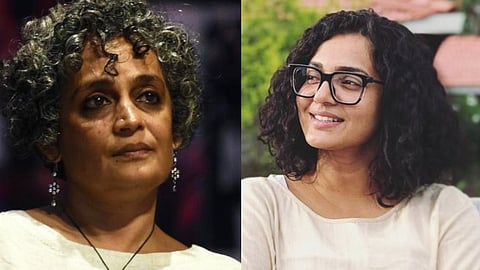

MANANTHAVADY: Author Arundhati Roy, in a conversation with actor Parvathy Thiruvothu at the Wayanad Literature Festival, highlighted how women, as noted in the Hema Committee report, have internalised their oppression to such an extent that they are unable to recognise it, and end up inadvertently contributing to it.
“I am so sad to hear about the Hema Committee report—it’s like your dirty little secret,” Roy said, addressing Parvathy on the final day of the festival. She emphasised that the issue cannot be framed as a men vs. women debate. “We are seeking a climate of change and culture, not just criminal action,” she added.
Roy pointed out that while women in Kerala are financially independent and part of the workforce, they are still far from truly free.
“In Kerala, women have financial freedom, but there is a generational guilt tied to that freedom,” said Parvathy Thiruvothu.
Parvathy also noted that, at least, the situation is beginning to “stink” and there is now “noise” in Mollywood. She expressed that the silence in other industries scares her more. There were no conversations or committees being formed, and the collective had to keep pushing for change, she said.
On the issue of “othering perpetrators,” Parvathy emphasised the need for prevention and prohibition, stating that punishment should follow its own course. “But for prevention, unfortunately, the mafia only responds to fear,” she explained.
When Roy asked if there was hope among the younger generation, Parvathy responded that most are quiet, and those who do speak out often do so merely for the “brownie points” of appearing “woke.” The speed at which perpetrators fund and produce films is “intimidating,” and dissenters often lack the necessary funding and support, she added.
However, Roy remains hopeful, drawing inspiration from the work of dissenters who create powerful films that rival the “mafia lords” in influence.
The artist vs art complexities
Regarding the art vs. artist debate, Roy stated that not every piece of art should be judged based on the purity and morality of its creator. Referring to figures like Roman Polanski and Alice Munro, she remarked, “By woke standards, we would not be reading anything, leaving criminality aside.”
“We should be uncomfortable, morally outraged, and assess a work of art from a place of discomfort because art is not meant to be a moral guidebook,” she said. “A lot of evil people make beautiful art.”
Roy also suggested that an author does not “own” a book; the audience is free to consume and interpret it in their own ways. In Polanski’s case, she believes that while one doesn’t have to forgive him, that doesn’t mean his films should be ignored.
Parvathy added, “The debate has consumed us, and cancel culture comes into play, completely excluding the person involved, leaving no room for redemption.”
Both women view cancel culture as a reaction, rather than a revolution. Parvathy highlighted the tendency in today’s world, especially on social media, to immediately label things into neat categories. “It’s epidemic now to sort everything into boxes as soon as it comes,” she said.
Roy pointed out that this mindset often stems from privilege, and emphasised that solidarity is what matters most.
“We will never have a perfect set of people supporting a perfect set of people,” Roy said.
Parvathy concluded, “Your discomfort cannot be informed by your privilege.”